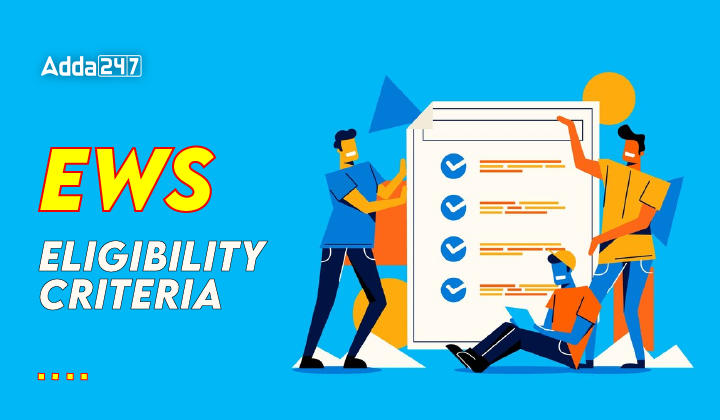Table of Contents
EWS Eligibility Criteria: In India, the eligibility criteria for the Economically Weaker Section (EWS) category were established to ensure that individuals from economically disadvantaged backgrounds have access to certain benefits, reservations, and opportunities provided by the government. The EWS category was introduced following the 103rd Constitutional Amendment in 2019, which aimed to provide 10% reservation in educational institutions and government jobs for individuals belonging to economically weaker sections of the general category.
EWS Eligibility Criteria
The Economically Weaker Section (EWS) reservation scheme aims to provide educational and employment opportunities for financially disadvantaged individuals from the unreserved category in India. Obtaining an EWS certificate verifies your eligibility for these benefits. Here’s a detailed breakdown of the EWS eligibility criteria:
General Requirements
- Category: The EWS category is specifically designed for individuals belonging to the general category who do not fall under any other reserved category such as Scheduled Castes (SC), Scheduled Tribes (ST), or Other Backward Classes (OBC). Therefore, applicants must not belong to any of these reserved categories to be eligible for the EWS reservation.
- Income: The primary criterion for determining eligibility under the EWS category is the annual family income of the applicant. As per the guidelines, individuals whose family’s annual income is less than Rs. 8 lakh are considered economically weaker. The income limit is determined by the respective state governments and may vary from one state to another. Generally, the income limit is set relatively low to target individuals with genuine economic hardships.
- Non-Ownership of Assets: Some authorities may also consider factors such as ownership of assets like land, property, vehicles, etc. while determining eligibility under the EWS category. Applicants who own significant assets may not qualify for EWS benefits, as the focus is on individuals with limited means.
-Agricultural land exceeding 5 acres.
-Residential flat with an area exceeding 1000 square feet.
-Residential plots exceeding 100 square yards in notified municipalities or 200 square yards in other areas.
Additional Points
- Income calculation: The annual income considered includes income from all sources like salary, agriculture, business, profession, etc., for the financial year preceding your application.
- State variations: Some states might have slightly different income or asset limits. Always check the official website of your state’s Revenue Department for the most accurate information.
- Exclusions: Even if your family income is below the limit, you might not be eligible if you or your family members hold certain positions like constitutional posts, government jobs, or positions in public sector undertakings.
- Family Definition: The “family” considered for income and asset assessment includes your parents, spouse, and minor children (below 18 years).
- Creamy Layer Exclusion: Similar to OBC reservation, EWS reservation also excludes the “creamy layer” individuals within the General category. Their income and assets must fall within the specified limits to be eligible.
EWS Full Form
EWS, or Economically Weaker Sections, is a socio-economic category addressing financial disparities, notably in India. Established through the 103rd Constitutional Amendment Act of 2019, it offers 10% reservation in education and government jobs for economically disadvantaged individuals from the general category. EWS initiatives aim to provide equitable opportunities and welfare support to those facing economic challenges, fostering inclusivity and reducing socio-economic inequalities in society.
EWS Certificate Process
The EWS (Economically Weaker Section) certificate process is a system established by the Government of India to provide benefits and reservations to individuals from economically weaker sections of society. This initiative aims to ensure that individuals from economically disadvantaged backgrounds have access to opportunities in education, employment, and various government schemes.
The process of obtaining an EWS certificate typically involves several steps and criteria:
- Eligibility Criteria: To apply for an EWS certificate, individuals must meet certain eligibility criteria defined by the government. Generally, individuals belonging to families with annual income below a certain threshold are eligible. The specific income threshold may vary depending on the state or union territory.
- Application Form: Interested individuals need to obtain the prescribed application form for the EWS certificate. These forms are usually available at local government offices, such as tehsil offices, municipal offices, or online portals.
- Document Submission: Applicants are required to submit supporting documents along with the application form. These documents typically include proof of identity, proof of residence, income certificate, and other relevant documents as specified by the authorities.
- Income Certificate: One of the critical documents required for obtaining an EWS certificate is the income certificate. This certificate validates the annual income of the applicant’s family and establishes their eligibility for the EWS category. The income certificate is issued by the designated authority after verifying the income details provided by the applicant.
- Verification Process: After submitting the application and supporting documents, the authorities conduct a thorough verification process to ensure the accuracy of the information provided. This may involve field visits to the applicant’s residence and cross-verification of the submitted documents.
- Issuance of Certificate: Upon successful verification of the application and documents, the competent authority issues the EWS certificate to the eligible applicant. The certificate typically includes details such as the applicant’s name, address, family income, and other relevant information.
- Validity Period: EWS certificates are usually valid for a specific period, as determined by the issuing authority. Individuals need to be aware of the validity period of their certificate and renew it as necessary to continue availing of the benefits and reservations associated with the EWS category.
It’s important to note that the process and requirements for obtaining an EWS certificate may vary from one state to another in India. Additionally, the government periodically updates the guidelines and criteria for the issuance of EWS certificates to ensure that they effectively reach and benefit the Economically Weaker Sections of society. Therefore, individuals seeking an EWS certificate should refer to the latest guidelines and instructions provided by the respective state or union territory authorities.
How to apply for EWS Reservations?
The EWS certificate, officially termed an ‘Income and Assets Certificate’, can be obtained from your local government authority, typically the Tehsil office. This certificate serves as the requisite proof to access the EWS category reservation benefits.
The government has not prescribed an online method for acquiring an EWS certificate. Therefore, individuals must visit their local Tehsil or another designated local government authority in person. Alongside the application, you will be required to submit additional documents such as Aadhar Card, PAN card, bank statements, passport-size photos, etc. Along with these documents, the Income and Assets Certificate, which can often be downloaded from various government websites, must be provided. The format of the EWS certificate typically resembles the following:

The EWS certificate, crucial for establishing one’s eligibility under the Economically Weaker Section category, is issued by designated government officials after thorough document verification. Only certificates issued by the following authorities are recognized as valid proof of a candidate belonging to the EWS category:
- District Magistrate/Additional District Magistrate/Collector/Deputy Commissioner/Additional Deputy Commissioner/1st Class Stipendary Magistrate/Sub-Divisional Magistrate/Taluka Magistrate/Executive Magistrate/Extra Assistant Commissioner
- Chief Presidency Magistrate/Additional Chief Presidency Magistrate/Presidency Magistrate
- Revenue Officer not below the rank of Tehsildar
- Sub-Divisional Officer of the area where the candidate and their family ordinarily reside.
These authorities are entrusted with the responsibility of verifying the authenticity of documents and issuing the EWS certificate to eligible candidates, affirming their status within the Economically Weaker Section category.




 TSPSC Group 1 Question Paper 2024, Downl...
TSPSC Group 1 Question Paper 2024, Downl...
 TSPSC Group 1 Answer key 2024 Out, Downl...
TSPSC Group 1 Answer key 2024 Out, Downl...
 UPSC Prelims 2024 Question Paper, Downlo...
UPSC Prelims 2024 Question Paper, Downlo...
